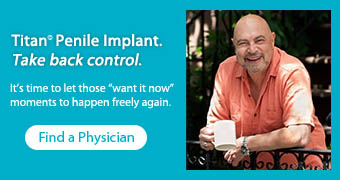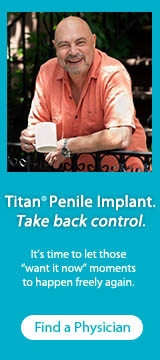Epidemic?
Evan David Rosen, M.D., Ph.D. Assistant Professor of Medicine, Harvard Medical School addresses another hidden factor in type 2 diabetes. Low Testosterone; A Hidden Epidemic?
Advertisement Low Testosterone in Type 2 Diabetes; A Hidden Epidemic?
Evan David Rosen, M.D., Ph.D. Assistant Professor of Medicine, Harvard Medical School
Among endocrinologists, it’s well-known that patients with type 1 diabetes are at risk for other hormonal disorders, including hypothyroidism, premature ovarian failure, and Addison’s disease (glucocorticoid deficiency). Like type 1 diabetes, these are all autoimmune diseases, and people who manifest one such disorder often manifest others as well.
It is less well appreciated that type 2 diabetes, which is not an autoimmune disorder, is also associated with other endocrine diseases, in particular hypogonadism in men. In women, ovarian disorders can sometimes be classified as hypogonadism. For instance, women with the polycystic ovarian syndrome are often (but not always) overweight, and thus can have a mixed pattern of insulin resistance and abnormal reproductive hormone levels. This can lead to irregular menstrual cycles, and this is a well-known if poorly understood phenomenon. But what I’m specifically talking about here is the association between low testosterone levels in men with type 2 diabetes.
Studies linking low testosterone levels to type 2 diabetes have been around since the early 1990’s, but they haven’t received much attention. Certainly, there are reasons why the link might not be as interesting as it appears at first blush. For example, both type 2 diabetes and low testosterone levels are associated with aging, and it doesn’t take an endocrinologist to figure that some older men will randomly have BOTH diabetes and low testosterone levels. But some studies have shown that testosterone levels are lower in diabetic men vs. non-diabetic men even if one carefully studies men of the same age.
Other skeptics have pointed out that obese men (who are more likely to have type 2 diabetes) have lower levels of sex hormone binding globulin (SHBG), a protein that acts as a carrier of testosterone in the blood. If SHBG levels are low, it will appear on blood tests as if testosterone levels are low, when in fact the "free" hormone that circulates in the blood unbound to SHBG will actually be normal.
But a new study shows that free testosterone levels, measured by a special assay, are in fact lower in men with type 2 diabetes than in non-diabetic men. Furthermore, this new study adds an interesting new wrinkle. Fully one third of the 103 men studied with type 2 diabetes had low total and free testosterone levels. But what was most intriguing was that these men did not seem to have the type of hypogonadism that comes with ageing, called primary hypogonadism. In this condition, the testes wear out, and so make less testosterone, despite high levels of the appropriate stimulating hormones from the pituitary gland. (Primary hypogonadism is what happens during menopause in women, for example, when the ovaries stop making estrogen). In these diabetic men, however, levels of the pituitary hormones were much lower than expected—suggesting that the men’s pituitary glands were not functioning properly. (Alternatively, the hypothalamus, the part of the brain that tells the pituitary what to do, could be malfunctioning).
Why is all this interesting? Well, for a few reasons. First, this form of hypogonadism is not considered to be all that common, and when we identify it, we usually search for relatively rare conditions, like large pituitary tumors. These observations suggest that there is a huge pool of men out there with this condition who are not being diagnosed. What are the effects of low testosterone levels? Well, they can range from virtually nothing to fatigue, anemia, bone loss, loss of sexual drive, and erectile dysfunction.
This last point in particular is important; diabetic men are highly prone to erectile dysfunction because of nerve damage and poor circulation. These conditions are difficult to treat, and many men suffer in silence because they never bring their erectile dysfunction to their doctor’s attention in the first place, or because there are few treatment options available even when they do talk about it. But hypogonadism is relatively easy to treat with testosterone supplements (usually given as a gel or a skin patch), suggesting that many men may not be receiving effective therapy for erectile dysfunction if they never get a testosterone level checked.
These results need to be confirmed in more diabetic men, and studies need to be done to look at the effectiveness of testosterone replacement in this group of patients. Testosterone replacement is not for everyone, as it can promote the growth of prostate cancer (which could be undiagnosed) and can (in rare instances) increase the number of red blood cells to the point that blood flow becomes sluggish. Nonetheless, any man with type 2 diabetes who complains of fatigue, loss of interest in sex, or erectile dysfunction should get total and free testosterone levels measured if they and their physician decide that they would be a candidate for testosterone. Eventually, testosterone measurement is likely to become routine in the treatment of men with diabetes, in the same way that cholesterol levels and blood pressure are now followed as a matter of course. Until then, it’s up to patients to ask, and doctors should be thinking about hypogonadism in all of their male patients with type 2 diabetes.
Diabetes & Testosterone FYI
-
dtwarren1942
- Posts: 1909
- Joined: Wed Oct 27, 2010 7:58 pm
- Location: Jersey Shore
Re: Diabetes & Testosterone FYI
Very interesting article, at least for me. I have been a Type 2 diabetic for 18 years. My endocrinologist has also been treating me for increasing ED symptoms for about 15 years. For the past two to three years, I have been noticing that my testosterone levels have been hovering around 300, plus or minus. I brought this to the attention of my endocrinologist last November; however, he dismissed it as a result of my age - 68 and mentioned that 300 is still within the acceptable range, albeit slightly above the bottom number - 280.
In November, I went to an urologist and started TRT using Testim 1% gel, which has improved my T level to 880 and also improved my libido, but, unfortunately, has not done much for my ED. I assume my neuropthy has out paced my improved testosterone.
Apparently, not all endocrinologists associate Type 2 diabetes with hypogonadism and, unfortunately, increased testosterone is not enough to overcome the nerve damage caused by diabetes. I went on an insulin pump a year ago which has allowed me to reduce my A1c level from 10+ down to 7, so far. The endocrinologist mentioned that the body's ability to cure itself is remarkable so perhaps the neuropothy will also improve over time.
Not time to throw in the towel.
In November, I went to an urologist and started TRT using Testim 1% gel, which has improved my T level to 880 and also improved my libido, but, unfortunately, has not done much for my ED. I assume my neuropthy has out paced my improved testosterone.
Apparently, not all endocrinologists associate Type 2 diabetes with hypogonadism and, unfortunately, increased testosterone is not enough to overcome the nerve damage caused by diabetes. I went on an insulin pump a year ago which has allowed me to reduce my A1c level from 10+ down to 7, so far. The endocrinologist mentioned that the body's ability to cure itself is remarkable so perhaps the neuropothy will also improve over time.
Not time to throw in the towel.
Age 81
Diabetic
Pumping
Started Trimix injections 8/'11
Diabetic
Pumping
Started Trimix injections 8/'11
- gregorbehr
- Posts: 148
- Joined: Wed May 26, 2010 5:39 am
- Location: San Francisco, CA
Re: Diabetes & Testosterone FYI
I'm 42, and have known about my Type II Diabetes for about 7 years.
About 3 years ago, I ran across a short article possibly linking low testosterone levels in men with Type II.
I showed it to my doc and she agreed to have the lab tests done. Sure enough, I was blowing a T level on par with an 11 year old girl!
So now I juice about every 7-10 days. Doesn't do much for the limpie (diabetes, heart meds and losing most of my prostate to an abscess, are my 3 strikes and I'm out), but my sex drive certainly isn't lacking!
I'm really surprised there has been so little research about this... but guys around my age or younger don't often discuss ED, and older gents get dismissed by most doc who haven't done any research into this correlation, as simply a fact of aging.
So to the Diabetic fellas out there, if you haven't already, or have a stubborn doc, this might be good information to share with them to get the blood work done.
About 3 years ago, I ran across a short article possibly linking low testosterone levels in men with Type II.
I showed it to my doc and she agreed to have the lab tests done. Sure enough, I was blowing a T level on par with an 11 year old girl!
So now I juice about every 7-10 days. Doesn't do much for the limpie (diabetes, heart meds and losing most of my prostate to an abscess, are my 3 strikes and I'm out), but my sex drive certainly isn't lacking!
I'm really surprised there has been so little research about this... but guys around my age or younger don't often discuss ED, and older gents get dismissed by most doc who haven't done any research into this correlation, as simply a fact of aging.
So to the Diabetic fellas out there, if you haven't already, or have a stubborn doc, this might be good information to share with them to get the blood work done.
51, San Francisco
Diabetic: used pills & injections.
2 TURP surgeries caused Peyronie's. 1st implant lost to infection, 2nd one is about 5 years old. But "floppy head" due to all the scar tissue, couldn't get tips all the way up.
Diabetic: used pills & injections.
2 TURP surgeries caused Peyronie's. 1st implant lost to infection, 2nd one is about 5 years old. But "floppy head" due to all the scar tissue, couldn't get tips all the way up.
-
dtwarren1942
- Posts: 1909
- Joined: Wed Oct 27, 2010 7:58 pm
- Location: Jersey Shore
Re: Diabetes & Testosterone FYI
gregorbehr wrote:.
So to the Diabetic fellas out there, if you haven't already, or have a stubborn doc, this might be good information to share with them to get the blood work done.
I second the motion
Age 81
Diabetic
Pumping
Started Trimix injections 8/'11
Diabetic
Pumping
Started Trimix injections 8/'11
Re: Diabetes & Testosterone FYI
I am a newbie to the forum so please bare with me.
I am 65 years old with Type II diabetes. I have ED and lowT. My Uroligist
has been injecting me with Testopel pellets 75mg. either 18 or 20 pellets every 6 mo.
My T level is around 600/800. I felt my energy pick up almost immediately.
The pellets are injected in the butt cheeks rather deep. Very convenient and pain free.
I have not seen any improvement in my ED at all. My sex drive I consider to be normal to high.
I have tried Viagra as well as Cialis neither seem to be very effective at all for me.
So far my wife has been very understanding. I think that is because she has
low sex drive.
My next visit to my Doctor I will have a serious conversation about injections
or pumping. I have picked up a lot of knowledge from this site and thank you all very much.
I am 65 years old with Type II diabetes. I have ED and lowT. My Uroligist
has been injecting me with Testopel pellets 75mg. either 18 or 20 pellets every 6 mo.
My T level is around 600/800. I felt my energy pick up almost immediately.
The pellets are injected in the butt cheeks rather deep. Very convenient and pain free.
I have not seen any improvement in my ED at all. My sex drive I consider to be normal to high.
I have tried Viagra as well as Cialis neither seem to be very effective at all for me.
So far my wife has been very understanding. I think that is because she has
low sex drive.
My next visit to my Doctor I will have a serious conversation about injections
or pumping. I have picked up a lot of knowledge from this site and thank you all very much.
67 yr's young. Loving wife and 4 children 7 grandchildren. Type II diabetic for 9 years. Could retire but love my job and the people I work for. Pills, Pumps & Injections all failed. Implanted on 9/2/11. I am now "Bionic":)
Re: Diabetes & Testosterone FYI
I'm a Vietnam vet and have VA disability as a result of agent orange (AO) exposure. The AO presumptively resulted in my Type II Diabetes and prostate cancer (PCa). While I can deal with the diabetes effectively (A1C was 5.6 last time and 5.2 the time before), the ED that was initially started by the diabetes and finished by the radical prostatectomy, isn't so effectively dealt with. Of course, I asked my urologist about testosterone therapy, but because I'm only 3 years post-op and remain cancer free, he discourage the therapy. He reminded me that there's a strong association with increased testosterone levels and prostate cancer, meaning it's believed that PCa feeds on testosterone. My levels aren't terribly low, but I figured I wouldn't have anything to lose. But I've read enough about it and PCa to know it's not worth the risk. He asked me, "with all you've been thru to rid yourself of the cancer, are you willing to risk it returning with the therapy?" Of course, my answer was no. He said after the 5 year mark, if I still wanted it, we'd revisit it. So that's fine with me. I know that the T-therapy won't bring back my erections anyway and I have to rely on shots to get a woodie, but they work quite nicely.
Age 63 married 41 years...2 kids and 2 grandkids. Had robotic RP in Apr 2008. Negative PSA since then. Suffered ED initially from Type II diabetes and then the RP. Had AMS700 LGX implant on 7 Nov 11.
-
RobinWriter
- Posts: 13
- Joined: Tue Apr 12, 2011 8:09 am
Re: Diabetes & Testosterone FYI
With all due respect to Dr. Rosen, he’s put the cart before the horse. In his first sentence he correlates Addison’s disease with type 1 diabetes. Addison’s is a sign of a low functioning adrenal gland... very low indeed; statistically speaking, more than 2 standard deviations away from the norm. But the "norm" is established within a population that almost universally suffers from poor adrenal function.
This is called Adrenal Fatigue and was first characterized over a hundred years ago. However, somewhere along the way, mainstream medicine has completely lost track of this most serious of conditions that CAUSES – is not simply covariant or a result of – diabetes. You don't have to have Addison's disease to be suffering the ill effects of adrenal fatigue.
Any support of the adrenal glands mitigates diabetes. What burns out adrenals? Stress is the biggest factor. Plus the daily intake of chemicals and compounds that attach your liver.
More about this in my book and on my blog.
Robin D. Ader
http://RobinsBlogForMen.blogspot.com
This is called Adrenal Fatigue and was first characterized over a hundred years ago. However, somewhere along the way, mainstream medicine has completely lost track of this most serious of conditions that CAUSES – is not simply covariant or a result of – diabetes. You don't have to have Addison's disease to be suffering the ill effects of adrenal fatigue.
Any support of the adrenal glands mitigates diabetes. What burns out adrenals? Stress is the biggest factor. Plus the daily intake of chemicals and compounds that attach your liver.
More about this in my book and on my blog.
Robin D. Ader
http://RobinsBlogForMen.blogspot.com
Return to “General Discussion”
Who is online
Users browsing this forum: Never_Enough and 109 guests






